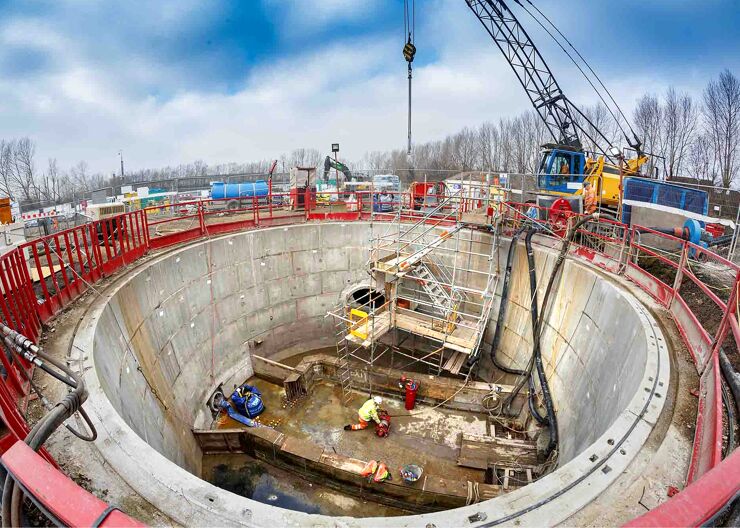
NEC contracts have been used to install state-of-the-art self-cleansing screens in a major combined sewer overflow in northern England. The £7 million scheme at Johnson Street in Gateshead has significantly improved water quality in the River Tyne and boosted network resilience.
NEC Users’ Group gold member Northumbrian Water let the design and construction to Esh-Stantec, a joint venture between Esh Construction and Stantec, in October 2019 under an NEC3 Engineering and Construction Contract (ECC) Option C (target contract with activity schedule). The joint venture has been on the client’s water and wastewater infrastructure framework since 2015.
In a first for the contractor, Esh-Stantec engaged each of its tier 2 suppliers, including Active Tunnelling, Huber Technology and Retroflo, using an NEC3 Engineering and Construction Subcontract (ESC) option C, replicating its own contractual terms and benefits throughout the supply chain. It had previously used ECS option A (priced subcontract with activity schedule).
The project involved installing two high-flow-rate mechanical self-cleansing screens and an automated penstock in a new 10.5 m diameter shaft over the existing 6 m deep Tyneside interceptor sewer. The screens now catch all solids of 6 mm and above in sewage overflows up to 1800 l/s caused by 1-in-5-year storm events.
Other works included pipejacking a new 1.8 m diameter 250 m long overflow sewer, breaking out 100 m of dry-weather flow channel in the existing sewer to increase capacity, and modifying the existing storm overflow chamber with a stainless-steel weir to become a network relief point. Existing sewage flow was diverted for over 6 months via a temporary pumping station.
The project was completed two months early in January 2022 for a total cost of £6.95 million, which was £0.9 million under the original target cast. It was shortlisted for the Utility Project of the Year in the 2022 British Construction Industry Awards.
Collaborative working environment
Project manager Ian Davison says NEC’s clear allocation of roles and responsibilities and its requirement to work in a ‘spirit of mutual trust and co-operation’ has created a collaborative working environment across all Northumbrian Water’s framework partners in line with the company’s business principles.
‘The NEC-inspired mutual trust and co-operation which already existed with Esh-Stantec was further enhanced during the delivery of the Johnson Street project. The contract encouraged great performance, with all parties working in a spirit of collaboration and adopting a pragmatic approach to resolve issues quickly, driving the team towards joint goals of achieving project outcomes.’
He says NEC’s contractual mechanisms for proactive programme and risk management ensured issues were dealt with promptly and effectively, helping to minimise the effects on time and cost. ‘Issues and risks were managed in accordance with the contract, with timely early warning notifications and well-attended and amicable risk reduction meetings. All compensation event settlements were generally administered within the required contractual timescales.’
Incentivised supply chain
He says the ECC Option C target cost contract was chosen to incentivise the contractor to maintain or better the contract award value while ensuring project outcomes. ‘The shared pain/gain mechanism helped to drive the collaborative approach to solution development and delivery. This was further enhanced by Esh-Stantec’s decision to pilot the use of a back-to-back ESC option C subcontract for tier 2 suppliers, cascading incentivisation into the supply chain.’
Davison says that by using the same ethos of collaboration between all stakeholders involved, there was complete transparency regarding project spend, such that the best ‘value for money’ solution for all stakeholders was carried through to contractual implementation. ‘With aligned objectives and regular commercial review and risk-reduction meetings, all stakeholders were aware of potential changes to the target cost.’
He says the target was originally approved at £7.85 million with a completion date of March 2022. ‘Despite Covid restrictions and the inevitable challenges of working underground, the project was successfully completed in January 2022 for a total price of £6.95 million − and with zero accidents or service strikes.’
Benefits of using NEC
- NEC’s clear allocation of roles and responsibilities and its requirement to work in a ‘spirit of mutual trust and co-operation’ helped to create a highly collaborative working environment.
- NEC’s contractual mechanisms for proactive programme and risk management ensured issues were dealt with promptly and effectively, helping to minimise the effects on time and cost.
- Pain/gain share mechanism in ECC Option C main contract and back-to-back ECS option C tier 2 subcontracts incentivised the supply chain to maintain or better contract award values while ensuring project outcomes.




